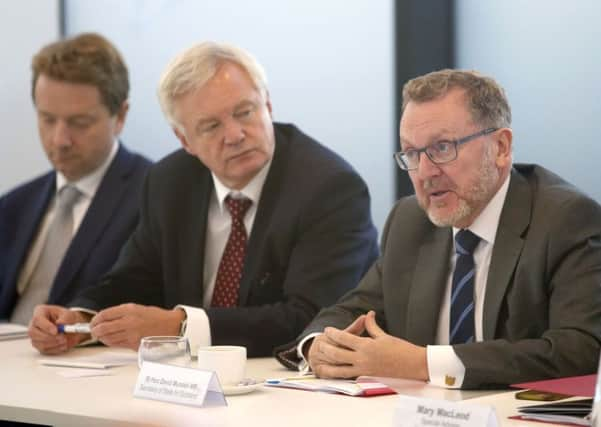'˜Fundamental' differences remain after Brexit talks


David Davis and Michel Barnier said their negotiating teams have inched towards a compromise on aspects of a deal on citizens’ rights after Brexit, but remained at an impasse on the role of the European court and the size of the UK’s ‘divorce bill’.
In a joint press conference at the end of a four-day round of talks, the EU’s chief negotiator singled out the UK’s refusal to set out its position on its financial obligations to the EU.
Advertisement
Hide AdAdvertisement
Hide AdMr Barnier said progress had only been possible “for the issues on which there was a clear British position”.
Both sides have agreed that talks on a vital post-Brexit trade deal between the UK and EU cannot begin until “sufficient progress” has been made on the issues of citizens’ rights, the multi-billion pound financial settlement, and Northern Ireland border.
The EU has set a deadline of October for talks to move to the next phase in order for there to be enough time to negotiate the UK’s future relationship and agree a transition period to prevent a ‘cliff edge’ change in trading terms.
Mr Barnier said: “A clarification of the UK position is indispensable for us to negotiate and for us to make sufficient progress on this financial dossier, which is inseparable from the other withdrawal dossiers.
“What we want - and we are working on this - is an orderly withdrawal for the United Kingdom, that’s decided. An orderly withdrawal means accounts must be settled.
“We know that agreement will not be achieved through incremental steps. As soon as the UK is ready to clarify the nature of its commitments, we will be prepared to discuss this with the British negotiators.”
The EU chief negotiator also called for further detail on how the UK Government intends to make the Common Travel Area with the Republic of Ireland work after Brexit ahead of the next round of talks, expected in August.
He said: “We require this clarification on the financial settlement, on citizens’ rights, on Ireland - with the two key points of the common travel area and the Good Friday Agreement - and the other separation issues where this week’s experience has quite simply shown we make better progress where our respective positions are clear.”
Advertisement
Hide AdAdvertisement
Hide AdMr Barnier the EU was not ready to compromise in the negotiations until the UK accepts its financial obligations. He said: “I know one has to compromise in negotiations but we are not there yet.”
Underlining his position on the “fundamental importance” of citizens’ rights being protected by EU law and the ECJ, Mr Barnier said: “This is not a political point we are making, it’s a legal one.
“Simply, if there is to be continuity of EU law, that has to be framed by case law of the court. Only the court can interpret EU law.
“It’s not a choice, it’s an obligation.”
Mr Davis told journalists in Brussels: “Overall I’m encouraged by the progress we have made on understanding each other’s positions.”
The UK Brexit secretary said the talks had demonstrated the UK had made a “fair and serious offer” on citizens’ rights and there were “many concrete areas where we agree, as well as areas where there will be further discussion” which will be a priority in the next round.
On the financial settlement, Mr Davis said: “We both recognise the importance of sorting out the obligations we have to one another, both legally and in a spirit of mutual cooperation.”
In a sign of the difficulties in reaching agreement he added: “We have had robust but constructive talks this week. Clearly there’s a lot left to talk about and further work before we can resolve this.
“Ultimately getting to a solution will require flexibility from both sides.”
